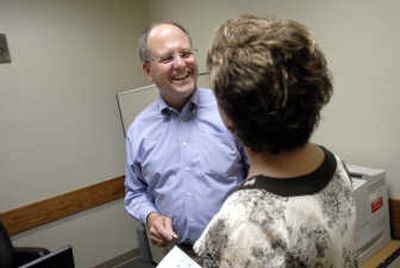No summer vacation

Despite retiring Friday as the chief of Spokane Public Schools, Brian Benzel isn’t wasting any time getting back to business.
Benzel, 59, reported today to his new post as vice president of finance and administration at Whitworth University. “I can’t imagine not having something to do,” Benzel said.
After six years as superintendent of the state’s second-largest public school system, Benzel announced in February he would retire to accept the job at the Christian college that on Sunday officially changed its name to Whitworth University.
Benzel was selected by the school board in 2001 to replace Gary Livingston, now chancellor of the Community Colleges of Spokane.
While his last months have been filled with uncomfortable decisions, such as the closure of a school and budget cuts of more than $10 million, Benzel will also be remembered as a visionary leader who helped boost test scores and create innovative programs, his advocates say.
“He inherited huge issues and huge problems,” said Maureen Ramos, president of the Spokane Education Association. “But he’s always been willing to listen.”
Benzel, a native of Ritzville, was hired at a time when enrollment began a steady downward spiral. The demographics of the district changed as families headed to new suburban housing developments. Education reform both nationally and at the state level was starting to take root, including the No Child Left Behind Act and the frenzy surrounding implementation of standardized state tests such as the WASL.
Benzel’s background in business and finance made him a standout for the job of managing a staff of 5,000 and the education of 30,000 students, school officials said. At that time he was the No. 2 guy at Seattle Public Schools, and had been superintendent in Edmonds, Wash., and a policy analyst for the Legislature.
“His business background has really been a blessing,” said school board president Christie Querna, who was on the board that hired Benzel.
His first year, Benzel slashed $5 million from the district’s budget but won support by first soliciting formal input from teachers, parents and the public. “My first year I spent listening to a lot of people,” Benzel said. “I went to as many places as I could go to learn about Spokane Public Schools.”
Successful programs created under Benzel’s watch include a cooperative for home-schooled children and Spokane Virtual Learning, the district’s Internet-based school. He also helped create a new strategic plan for the district, and encouraged more professional development for teachers and principals. Litigation has also been a part of Benzel’s legacy. He has guided the district through numerous high-profile lawsuits, including one with The Spokesman-Review over public records regarding the death of a 9-year-old boy with a peanut allergy who was given a peanut-laden sack lunch during a school field trip. Other litigation included a suit over funding for special education, and during his final board meeting last week he listened as the board decided to join a lawsuit against the state over how education is funded.
Despite grumblings from the public, the district has maintained transparency during difficult times, Benzel said.
“We’ve worked very hard to be open,” he said. “Sometimes, turmoil can undermine good work.”
Benzel’s history with Spokane goes back to the 1970s, when he was the business manager of the Mead School District and regularly dealt with administrators from Spokane.
“Spokane was always recognized for people who knew how to get things done,” he said.
It was clear the district was well-managed, and slightly above average in terms of state test scores, he said.
“The thing I had to grapple with was how do you take a good system and help it be better,” Benzel said. He asked the board to set the goal of having 90 percent of fourth-, seventh- and 10th-graders passing the reading and math portions of the WASL by 2007.
His lofty vision was not well-received by everyone.
“It certainly was shocking to staff who were going, ‘That’s a great goal, now how do we achieve it?’ ” Ramos recalled.
“I know everyone thought the new super was a lunatic,” Benzel said. “We haven’t hit that goal, but we’ve come a long way.”
The district has worked hard to close the gap and shatter the connection between poverty and low performance, he said. Nearly half of Spokane’s students qualify for free- and reduced-price lunches, often considered a measure of poverty.
“I think he wanted to challenge us; it really reflected his belief in children and that they were capable of achieving at higher levels,” said Nancy Stowell, who has been appointed interim superintendent.
State test scores for fourth-graders in 10 of the district’s 35 elementary schools show at least 90 percent of meeting standard on the reading WASL. In 2001-2002, 65 percent of fourth-graders were passing the reading test districtwide.
Math is a different story. About 62 percent of fourth-graders passed the math portion of the test last year, compared to 58 percent in 2001.
But he won’t be worrying about WASL scores for too much longer.
“I’ve learned my craft as a school superintendent,” Benzel said. “Now I want to help build opportunities to grow the next generation of leaders.”